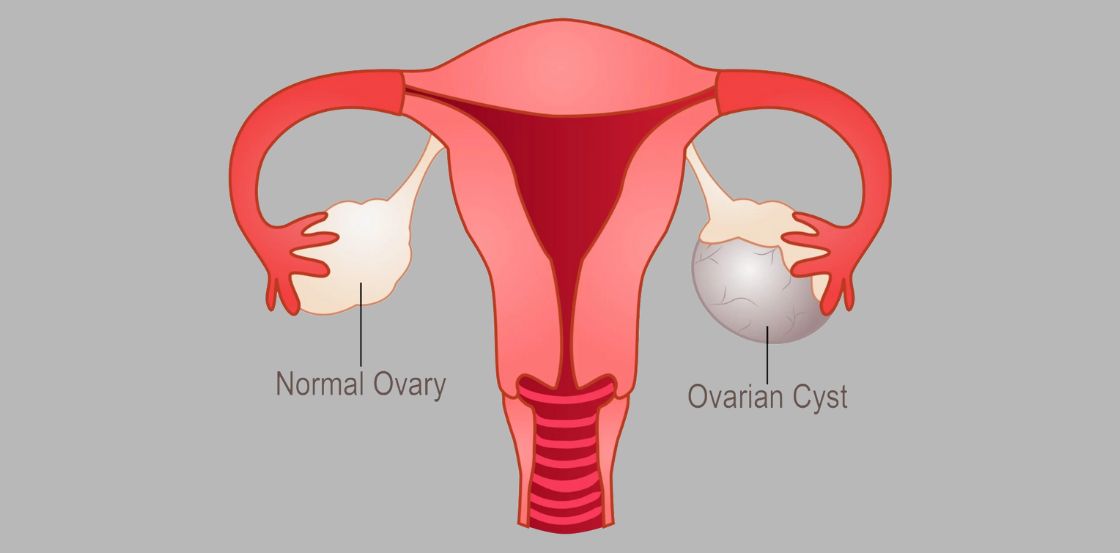Post link copied to clipboard!

Ovarian health is a primary concern for many women. Several conditions can impact ovarian health. One common trouble is whether ovarian cysts can lead to ovarian cyst bleeding, particularly between periods or for extended periods.
In this comprehensive medical blog, let’s explore the intricate relationship between ovarian cysts and bleeding. We’ll learn about symptoms, causes, and potential treatments, shedding light on this quintessential matter for women’s health.
Ovarian cysts are fluid-filled sacs that develop on or within the ovaries. These cysts are a natural part of the menstrual cycle, forming as part of the ovulation process.
Most ovarian cysts are small and benign, causing little to no discomfort. However, in some cases, they can grow larger or become complex, potentially leading to various symptoms, including bleeding.
Bleeding associated with ovarian cysts can manifest in different ways. Some women may experience spotting or bleeding between periods, while others might endure bleeding for extended periods.
This phenomenon is often linked to the type of cyst present, with haemorrhagic cysts, also known as haemorrhagic ovarian cysts, being a notable contributor.
Ovarian cyst bleeding usually comes with a variety of symptoms. These can include pelvic pain, discomfort during sex, irregular menstrual cycles, and bloating. Note that all bleeding is a cause for concern, but understanding the underlying factors is foremost in determining the appropriate treatment action.
The exact cause of bleeding in ovarian cysts can vary. Haemorrhagic cysts, for example, occur when a blood vessel within the cyst wall breaks, leading to internal bleeding. Cysts originating from endometrial tissue, known as endometriomas, can also induce bleeding due to the tissue’s inclination to shed and bleed.
In a nutshell, the following are the preliminary causes of ovarian cyst bleeding:
Some discomfort and bleeding may be usual with ovarian cysts. These warning signs warrant medical attention to ensure proper diagnosis and timely intervention.
A comprehensive approach is essential when diagnosing ovarian cysts and the accompanying bleeding. This process often encompasses:
These combined assessments help determine the most suitable treatment strategies for effectively managing ovarian cysts and addressing associated bleeding concerns.
Treatment approaches vary based on the severity of symptoms, the type of cyst, and the patient’s overall health. Small, uncomplicated cysts may resolve on their own over time.
Explore some safe and effective ways to manage ovarian cysts and find relief:
Maintaining ovarian health is crucial in preventing the development of problematic cysts. A healthy lifestyle that includes a balanced diet, regular exercise, and stress management can contribute to overall well-being and reduce the risk of cyst formation.
Living with ovarian cysts requires a holistic approach. Women are encouraged to stay informed about their condition, attend regular check-ups, and prioritise self-care. Open communication with healthcare providers ensures timely intervention and personalised guidance.
There are several misconceptions surrounding ovarian cysts and bleeding. One common myth is that all cysts lead to bleeding. While bleeding can occur, it is not a universal outcome. Understanding these nuances is essential in dispelling unfounded fears.
Distinguishing between ovarian cysts and other gynaecological conditions is imperative for accurate diagnosis and treatment. Conditions such as fibroids, endometriosis, and pelvic inflammatory disease can share similar symptoms, underscoring the importance of professional medical evaluation.
Advancements in medical research continue to shed light on ovarian health. Ongoing studies aim to uncover more about the causes, prevention, and treatment of ovarian cysts and related complications, offering hope for improved outcomes and enhanced quality of life for affected individuals.
In conclusion, while ovarian cysts can indeed cause bleeding, the occurrence is not universal and varies depending on the type and nature of the cyst. Recognising the symptoms, understanding potential causes, and seeking medical attention when necessary are crucial steps in managing ovarian cysts and promoting overall gynaecological health.
While bleeding can occur with ovarian cysts, it is not a guaranteed outcome. The likelihood of bleeding depends on factors such as the type and size of the cyst.
Haemorrhagic cysts are typically benign and non-cancerous. However, professional medical evaluation is necessary to rule out any underlying concerns.
In some cases, ovarian cysts may impact fertility. Consult a healthcare provider for personalised guidance if fertility is a concern.
Treatment options vary and depend on factors such as the severity of symptoms and the type of cyst. Medical professionals may consider hormonal therapy, pain management, or surgical removal.
While not all ovarian cysts can be prevented, maintaining a healthy lifestyle, managing stress, and attending regular check-ups can contribute to ovarian health.